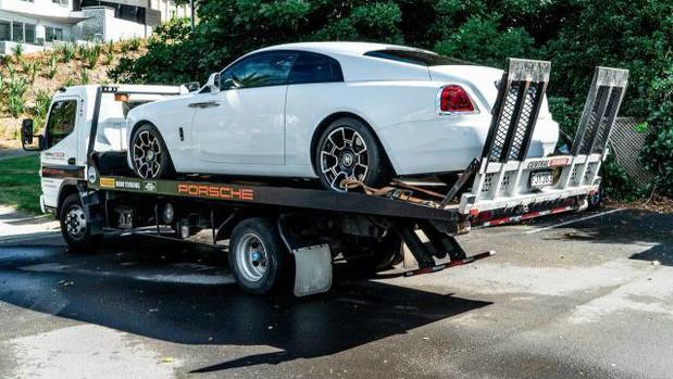
The vice-president of the Comancheros and an Auckland lawyer have both admitted laundering millions of dollars for the outlaw motorcycle gang.
Tyson Daniels - who is second-in-command of the gang's Auckland chapter - changed his stance and pleaded guilty to nine counts of money laundering in the High Court at Auckland this morning.
A charge of participating in an organised criminal group between May 2017 and April 2019 was also admitted by Daniels, a 30-year-old who was living in the affluent Auckland suburb of Mellons Bay until his arrest in April.
The money laundering charges came from Daniels purchasing a swag of expensive vehicles.
There were four Range Rovers - with price tags of $175,000, $255,000, $218,000 and $280,000 - a $200,000 Mercedes Benz, a Lamborghini for $285,000, and two Rolls-Royces which cost $364,000 and $595,000.
/arc-anglerfish-syd-prod-nzme.s3.amazonaws.com/public/PQENYPYEPZAPFE6XVHXDSPQMJQ.jpg?width=464&height=464&mode=max)
Tyson Daniels is the vice president of the Comancheros in New Zealand. Photo / Supplied
The luxury fleet was seized in April when police raided Daniels and other members of the Comancheros, as well as associates, following a year-long investigation codenamed Operation Nova.
Yet, just one month after his arrest, Daniels purchased another Mercedes Benz for $215,000 and another $247,000 was found in the home.
The police allege the Comancheros, an Australian gang which set up shop in New Zealand after a number of senior members were deported here, are behind significant drug smuggling linked to a Mexican cartel.
Daniels was not charged with any drug offences. He was convicted and remanded in custody by Justice Simon Moore until his sentencing in February.
Also appearing in the High Court today, was the Auckland lawyer who helped Daniels - and allegedly others - launder cash on behalf of the Comancheros.
His identity has been kept secret but the interim suppression order was lifted this morning.
The Herald can now report Andrew Neill Simpson pleaded guilty to 13 charges of money laundering - crimes he committed while a solicitor at a private legal practice in Auckland's west.
Simpson, who has a young family, played a key role in facilitating laundering $2.4m through his law firm's trust account.
More than $1.2m in cash was deposited into Simpson's trust account, which was also used to purchase some of the cars belonging to Daniels and allegedly others in the gang.
The lawyer was convicted by Justice Moore and released on bail until his sentencing in February.
"A sentence of home detention is far from assured," the judge told Simpson.
/arc-anglerfish-syd-prod-nzme.s3.amazonaws.com/public/4RWOB3KY6NDWVED53HKUB77J7Q.jpg)
Auckland lawyer Andrew Simpson was charged with laundering more than $2.4m for the Comanchero gang. Photo / Sam Hurley
The surprise admission of guilt made by Daniels and Simpson come as others, including Comanchero president Pasilika Naufahu, maintain their not guilty pleas and head towards a High Court trial next September.
Others arrested in Operation Nova include an accountant and media personality, who both have interim name suppression.
A $10,000 gold chain and a $13,000 Louis Vuitton bag are among the $4m of assets seized in April, including the $1.6m home in the exclusive east Auckland suburb of Bucklands Beach where Naufahu - who has pleaded not guilty to all charges - was living.
At the time of the arrests, Detective Superintendent Greg Williams said the Comancheros used wealth to market themselves.
"We are determined to strip them of that wealth that we allege has come from criminal offending, and take the profit out of it."
/arc-anglerfish-syd-prod-nzme.s3.amazonaws.com/public/E4ACIW525VBIROAZADOZN56DUI.jpg)
Goldplated motorcycles were among the $4m assets seized in Operation Nova. Photo / Supplied
The raids across Auckland was the second termination phase of Operation Nova, an investigation into the gang, the alleged importing of drugs into the New Zealand and the laundering of millions of dollars.
The first phase of Operation Nova was announced in February with no mention of any links to the Comancheros.
Customs officers found 5kg of methamphetamine hidden inside cooking appliances, leading police to find another 6kg of the Class-A drug.
Four people were arrested in Auckland; a 50-year-old New Zealander, a 33-year-old Chinese national, a 60-year-old Canadian national and a 19-year-old from the United States.
/arc-anglerfish-syd-prod-nzme.s3.amazonaws.com/public/BBL5WDJYDZHWVDSDHFDJMQJ3KY.jpg)
Late model Range Rovers were among the $4m assets seized in Operation Nova. Photo / Supplied
Police believe the methamphetamine was smuggled from the United States, which in turn is likely to have been manufactured in Mexico by cartels.
The Canadian man arrested had a son living in Fiji, where two detectives from the National Organised Crime Group were sent to work with local police.
They found 39kg of cocaine at one address in Suva with a street value of around $20 million.
/arc-anglerfish-syd-prod-nzme.s3.amazonaws.com/public/JIGMVPNIGBABVH5D3SDTNTZPSQ.jpg)
Operation Nova found methamphetamine hidden inside kitchen appliances. Photo / Supplied
Then following the Operation Nova raids in April, a New Zealander living in Sydney was arrested by Australian Federal Police.
The 40-year-old was extradited earlier this year over 23 charges for drug importation and supply, participating in an organised criminal group, and money laundering.
Operation Nova terminated about 12 months after the Comancheros publicly announced their arrival on social media.
Wearing the black and gold colours, six members gathered around gold-plated motorcycles in a series of photographs posted online
"All done and sworn in...welcome aboard to my brothers in New Zealand," says the Instagram post by an Australian member of the Comancheros.
"Another Comanchero chapter opened up. We growing stronger and stronger."
/arc-anglerfish-syd-prod-nzme.s3.amazonaws.com/public/KRFGZIGRZNHJPGCVSMHGXBVDEY.jpg)
The Instagram post announcing the arrival of the Comancheros in New Zealand. Photo / Supplied
The display was a powerful statement - to the police and other gangs in New Zealand - which came a week after the ex-president of the Comancheros, Mahmoud "Mick" Hawi, was fatally gunned down in a Sydney gym car park.
A New Zealand chapter was "inevitable" following the deportation of 14 Comancheros, Williams told the Herald on Sunday at the time.
They were among the "501" deportees - so nicknamed because of the "character grounds" section of the immigration law used to remove them from Australia.
"It's concerning. Like the other Australian gangs, the Rebels and the Bandidos, we expect the Comancheros will attempt to establish themselves in the drug market within New Zealand," said Williams.
Given some of the extreme violence between rival Australian gangs which can spill into the public, Williams acknowledged the potential for the same to happen here.
"The reality of gang life, whether it's seen by the public or not, is one of violence. When dealing with the gangs, we're finding people with all sorts of firearms," Williams said last year.
"And there is friction when gangs try to move into an established drug market. So there may be [violence] that comes out of this. To date, there hasn't been.
"It will be interesting to see what happens."
A month later, in April 2018, an Auckland man was shot in the head in an execution-style killing on the orders of the Comancheros gang.
Epalahame Tu'uheava and his wife were both shot several times in Māngere.
Tu'uheava, a 28-year-old father also known as Hame or Abraham, died within minutes.
His wife survived by playing dead, despite being shot twice in the head.
Viliami Taani, a Comancheros member described by Yolanda as the "main guy", has admitted charges of murder and attempted murder and will serve a minimum of 17 years 6 months behind bars.
Take your Radio, Podcasts and Music with you









